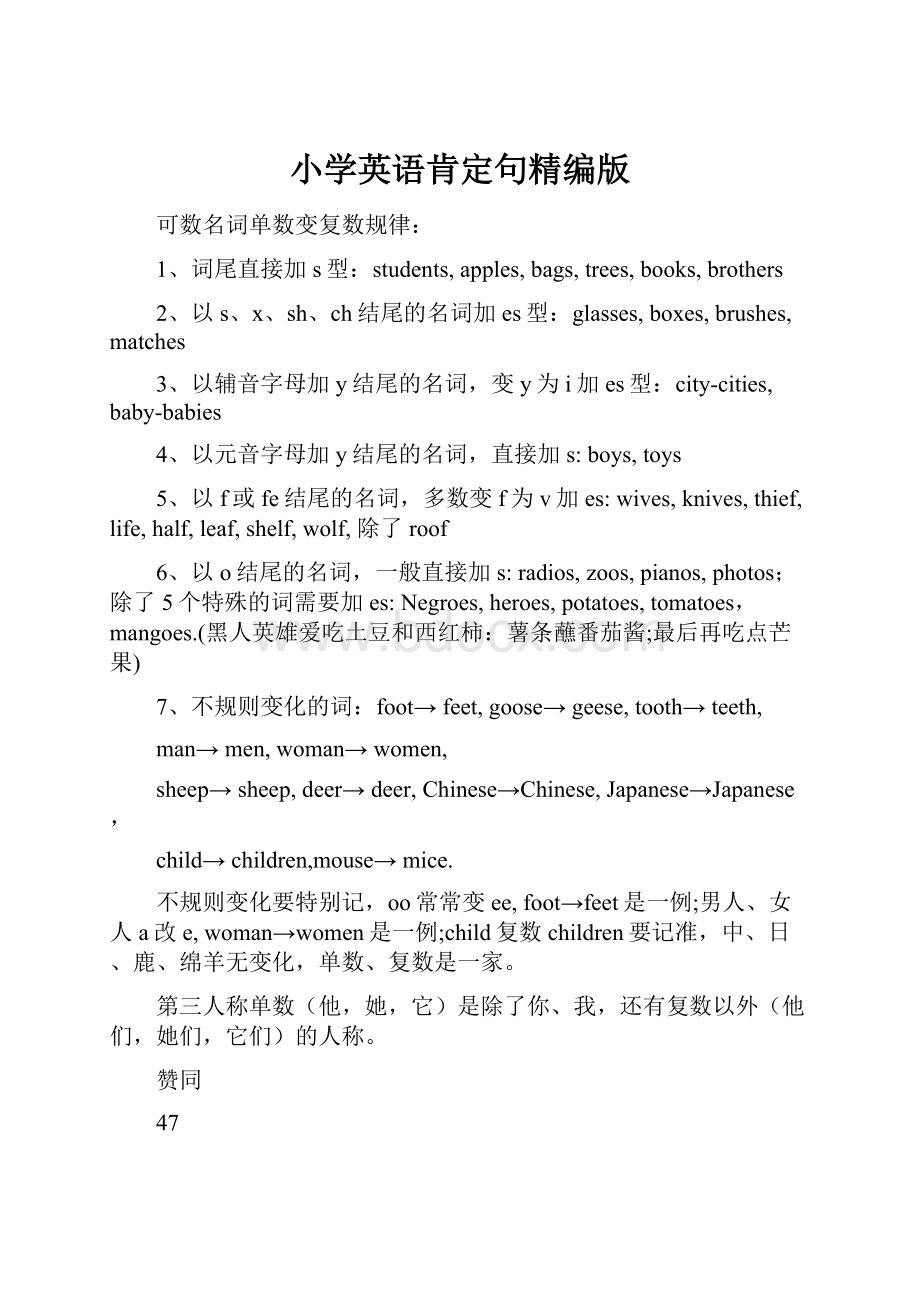小学英语肯定句精编版.docx
《小学英语肯定句精编版.docx》由会员分享,可在线阅读,更多相关《小学英语肯定句精编版.docx(22页珍藏版)》请在冰豆网上搜索。

小学英语肯定句精编版
可数名词单数变复数规律:
1、词尾直接加s型:
students,apples,bags,trees,books,brothers
2、以s、x、sh、ch结尾的名词加es型:
glasses,boxes,brushes,matches
3、以辅音字母加y结尾的名词,变y为i加es型:
city-cities,baby-babies
4、以元音字母加y结尾的名词,直接加s:
boys,toys
5、以f或fe结尾的名词,多数变f为v加es:
wives,knives,thief,life,half,leaf,shelf,wolf,除了roof
6、以o结尾的名词,一般直接加s:
radios,zoos,pianos,photos;除了5个特殊的词需要加es:
Negroes,heroes,potatoes,tomatoes,mangoes.(黑人英雄爱吃土豆和西红柿:
薯条蘸番茄酱;最后再吃点芒果)
7、不规则变化的词:
foot→feet,goose→geese,tooth→teeth,
man→men,woman→women,
sheep→sheep,deer→deer,Chinese→Chinese,Japanese→Japanese,
child→children,mouse→mice.
不规则变化要特别记,oo常常变ee,foot→feet是一例;男人、女人a改e,woman→women是一例;child复数children要记准,中、日、鹿、绵羊无变化,单数、复数是一家。
第三人称单数(他,她,它)是除了你、我,还有复数以外(他们,她们,它们)的人称。
赞同
47
|同学们,快来看看自己做的怎么样吧!
写出下列名词的复数形式:
I this that watch child photo diary(日记) day(天)
foot book dress(连衣裙) tooth sheep box strawberry
wolf peach yo-yo(悠悠球) sandwich man woman
paper water juice tea mouse
Thereare56 (people)inChina.
答案:
we these those watches children photos diaries days
feet books dresses teeth sheep boxes strawberries
wolves peaches yo-yos(悠悠球是“无生命”的,另外含有-符号的词是一个词,因此在结尾加s) sandwiches men women
paper water juice tea mice
peoples(这句话的意思是---“中国有56个民族”)评论
小学英语肯定句、否定句、一般疑问句和特殊疑问句的详解
一、be动词:
am,is,are
二、肯定句、否定句、一般疑问句和特殊疑问句定义
1.肯定句:
表示肯定的意思,即不含有否定词“不”。
比如:
我是一个学生Iamastudent.
他去上学Hegoestoschool.
2.否定句:
表示否定的意思。
比如:
我不是一个男孩。
Iamnotaboy
他不去上学Hedoesnotgotoschool.
3.一般疑问句:
回答为“是yes”或者“否no”的问句。
比如:
你是一个学生吗?
Areyouastudent?
你喜欢英语吗?
DoyoulikeEnglish?
4.特殊疑问句:
回答不是“是yes”或者“否no”的问句,根据提问内容具体回答。
比如:
现在几点了?
What’sthetime?
哪一支笔是你的?
Whichisyourpen?
三、肯定句、否定句、一般疑问句和特殊疑问句的相互转换
有am,is,are的句子,
肯定句变否定句:
在am,is,are后面加上not,其余按顺序照抄。
肯定句变一般疑问句:
把am,is,are提前放到句首并大写Am,Is,Are,其余照抄。
肯定句变特殊疑问句(就划线部分提问):
分3步骤
第一步:
先变一般疑问句
第二步:
找合适的特殊疑问词代替划线部分
第三步:
特殊疑问词提前放到句首,并大写,其余按顺序照抄,省略划线部分。
注意:
1.一定先变一般疑问句。
但是,如果问的是主语或主语的定语时,语序不变,
为"特殊疑问词(+主语)+陈述句"。
如:
Liming'snotheretoday. Who'snotheretoday?
今天谁没来?
2.划线部分不能在特殊疑问句中出现。
when什么时间(问时间)
whatdate什么日期问具体日期
who谁(问人)
whatplace什么地点问具体地址
whose谁的问主人
how…怎么样问情况
where在哪里问地点
howold多大问年龄
which哪一个问选择
howmany多少问数量
why为什么问原因
howmuch多少问价钱
what什么问东西
howabout…怎么样问意见
whattime什么时间问时间
howfar多远问路程
whatcolour什么颜色问颜色
howlong多长问时间
whatabout…怎么样问意见
Howsoon多快,多久问时间
whatday星期几问星期
Howoften多久问频率
肯定句变为否定句时应注意的特殊情况
肯定句变为否定句时,通常必须在句中加上副词not。
可是对有些特殊的情况我们还必须加以注意,现根据初中英语教材对这些特殊情况说明如下:
1.如果肯定句中有连词and,变为否定句时,通常要将and变为or。
例如:
Thegirlcansinganddance.→Thegirlcannotsingordance.
Theboyhasfatherandmother.→Theboyhasnofatherormother.
(或Theboyhasnotanyfatherormother.)
2.如果肯定句中some,变为否定句时,some一般要改为any。
例如:
Therearesomeboysintheroom.→Therearenotanyboysintheroom.
3.如果肯定句中有too(也),变为否定句时,应将too改为either。
例如:
WangLingisateacher,too.→WangLingisnotateacher,either.
4.如果肯定句中有already,变为否定句时,应将already改为yet,并放在句末。
例如:
Theworkerhasfinishedhisworkalready.→Theworkerhasnotfinishedhisworkyet.
5.如果肯定句中有“hadbetter”,变为否定句时,not要放在“hadbetter”之后。
例如:
Youhadbetterwritetoyourteacher.→Youhadbetternotwritetoyourteacher.
6.如果肯定句中有always,变为否定句时,要将always改为never。
例如:
Shealwaysgoestoschoolatseveno'clock.→Shenevergoestoschoolatseveno'clock.
7.如果肯定句中有both,变为否定句时,要将both改为neither。
例如:
BothofusknowEnglish.→NeitherofusknowsEnglish.
8.如果肯定句中有all,变为否定句时,要将all改为none。
例如:
Allofthesebooksareyours.→Noneofthesebooksare(is)yours.
9.如果肯定句中有everybody,变为否定句时,要将everybody改为nobody。
例如:
Everybodyhasreadthebook.→Nobodyhasreadthebook.
10.如果肯定句中有everything,变为否定句时,要将everything改为nothing。
例如:
Everythingisdifficultforus.→Nothingisdifficultforus.
11.如果肯定句中有情态动词must,变为否定句时,其变化要按must在句中的确切含意而定。
如表示“不必”时,用“neednot(needn't)”;如表示“不准,不应是”时,则用“mustnot(mustn't)”。
例如:
Youmustfinishyourworkthisafternoon.→Youneedn'dfinishyourworkthisafternoon.
Thecarmustbeparkedhere.→Thecarmustn'tbeparkedhere.
12.在谓语动词为think,believe等后面接宾语从句时,习惯上将从句中的否定形式转移到主句的谓语部分中去。
例如:
Ithinkthatmysisterwillbebacksoon.→Idon'tthinkthatmysisterwillbebacksoon.
Ibelivethathewillgotoschooltomorrow.→Idon'tbelivethathewillgotoschooltomorrow.
例如:
1.肯定句、否定句和一般疑问句的互换
肯定句:
Thisisabook.
否定句:
Thisisnotabook.
一般疑问句:
Isthisabook?
肯定回答:
Yes,itis.
否定回答:
No,itisn’t.
2.就划线部分提问(变特殊疑问句)
Thisisabook.
第一步:
变一般疑问句Isthisabook?
第二步:
找合适的特殊疑问词Isthiswhat?
第三步:
特殊疑问词提前放到句首,并大写,其余按顺序照抄,省略划线部分。
Whatisthis?
没有am,is,are的句子,
肯定句变否定句:
在主语后面加上donot或者doesnot,其余按顺序照抄动词用原形
肯定句变一般疑问句:
在句首加do或者does并大写,其余照抄。
注意:
动词用原形
肯定句变特殊疑问句(就划线部分提问):
分3步骤
第一步:
先变一般疑问句
第二步:
找合适的特殊疑问词代替划线部分
第三步:
特殊疑问词提前放到句首,并大写,其余按顺序照抄,省略划线部分。
注意:
1.一定先变一般疑问句。
但是,如果问的是主语或主语的定语时,语序不变,为"特殊疑问词(+主语)+陈述句"。
2.划线部分不能在特殊疑问句中出现。
非单三时用do,单三时用does
非单三肯定句:
IlikeEnglish.
一般疑问句:
DoyoulikeEnglish?
否定句:
IdonotlikeEnglish.
单三肯定句:
HelikesEnglish.
一般疑问句:
DoeshelikeEnglish?
否定句:
HedoesnotlikeEnglish.
就划线部分提问:
IlikeEnglish.
第一步:
先变一般疑问句DoyoulikeEnglish?
第二步:
找合适的特殊疑问词代替划线部分Doyoulikewhat?
第三步:
特殊疑问词提前放到句首,并大写,其余按顺序照抄,省略划线部分。
Whatdoyoulike?
特殊:
1.some变为any。
如:
Therearesomebirdsinthetree.→Therearen'tanybirdsinthetree.
但是,若在表示请邀请、请求的句子中,some可以不变。
如:
Wouldyoulikesomeorangejuice?
与此相关的一些不定代词如something,somebody等也要进行相应变化。
2.and变为or。
如:
Ihaveaknifeandaruler.→Idon'thaveaknifeoraruler.
3.alotof(=lotsof)变为many或much。
如:
Theyhavealotoffriends.(可数名词)→Theydon'thavemanyfriends.
Thereislotsoforangeinthebottle.(不可数名词)
→Thereisn'tmuchorangeinthebottle.
4.already变为yet。
如:
Ihavebeentherealready.→Ihaven'tbeenthereyet.
一般现在时用法专练:
一、写出下列动词的第三人称单数
drink________go_______stay________make________
look_________have_______pass_______carry____
come________watch______plant_______fly________
study_______brush________do_________teach_______
二、用am,is,are填空
1.I______aboy.______youaboy?
No,I_____not.
2.Thegirl______Jack'ssister.
3.Thedog_______tallandfat.
4.Themanwithbigeyes_______ateacher.
5.______yourbrotherintheclassroom?
6.Where_____yourmother?
She______athome.
7.How_______yourfather?
8.MikeandLiuTao______atschool.
9.Whosedress______this?
10.Whosesocks______they?
11.That______myredskirt.
12.Who______I?
13.Thejeans______onthedesk.
14.Here______ascarfforyou.
15.Here______somesweatersforyou.
16.Theblackgloves______forSuYang.
17.Thispairofgloves______forYangLing.
18.Thetwocupsofmilk_____forme.
19.Sometea______intheglass.
20.GaoShan'sshirt_______overthere.
21.Mysister'sname______Nancy.
22.This______notWangFang'spencil.
23.______DavidandHelenfromEngland?
24.There______agirlintheroom.
25.There______someapplesonthetree.
26._______thereanykitesintheclassroom?
27._______thereanyapplejuiceinthebottle?
28.There_______somebreadontheplate.
29.There_______aboy,twogirls,threemenandtenwomeninthepark.
30.You,heandI______fromChina.
三、用括号内动词的适当形式填空。
1.Heoften________(have)dinnerathome.
2.DavidandTom_______(be)inClassOne.
3.We_______(notwatch)TVonMonday.
4.Mike_______(notgo)tothezooonSunday.
5.______they________(like)theWorldCup?
6.What_______theyoften_______(do)onSaturdays?
7._______yourparents_______(read)newspaperseveryday?
8.Thegirl_______(teach)usEnglishonSundays.
9.SheandI________(take)awalktogethereveryevening.
10.There________(be)somewaterinthebottle.
11.Mike_______(like)cooking.
12.They_______(have)thesamehobby.
13.Myaunt_______(look)afterherbabycarefully.
14.Youalways_______(do)yourhomeworkwell.
15.I_______(be)ill.I'mstayinginbed.
16.She_______(go)toschoolfromMondaytoFriday.
17.LiuTao_______(do)notlikePE.
18.Thechildoften_______(watch)TVintheevening.
19.SuHaiandSuYang_______(have)eightlessonsthisterm.
20.-Whatday_______(be)ittoday?
-It’sSaturday.
四、按照要求改写句子
1.DavidwatchesTVeveryevening.(改为否定句)
___________________________________________________
2.Idomyhomeworkeveryday.(改为一般疑问句,作否定回答)
________________________________________________________
____________________________
3.Shelikesmilk.(改为一般疑问句,作肯定回答)
_______________________________________________________
____________________________
4.Helenlikesplayingcomputergames.(改为一般疑问句,作否定回答)
________________________________________________________
____________________________________
5.Wegotoschooleverymorning.(改为否定句)
_______________________________________________________
6.HespeaksEnglishverywell.(改为否定句)
___________________________________________________
7.Iliketakingphotosinthepark.(对划线部分提问)
________________________________________________________
8.JimcomesfromCanada.(对划线部分提问)
___________________________________________________
9.Sheisalwaysagoodstudent.(改为一般疑问句,作否定回答)
________________________________________________________
________________________________
10.TomandDavidlikegoingskating.(改为否定句)
___________________________________________________
五